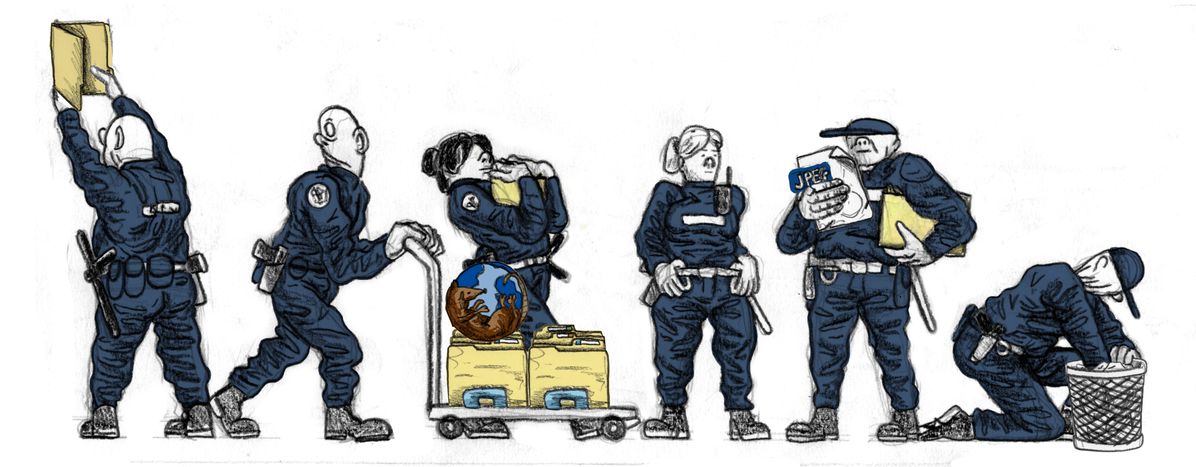
Web Police to Thought Police? (2) Interviewing the Polish Ombudsman
Published on
Translation by:
Joanna ParlakCafébabel chats with Adam Bendar, an Ombudsman in Poland, about how the lives of average citizens will be affected by the recent changed implemented by PiS (Law and Justice). His job includes ensuring that Pole's rights are not infringed by these changes.
This is the second part of an article that began with an interview with Piotr Kładoczny from the Helsinki Foundation for Human Rights.
cafébabel: Recently, we have seen a lot of drastic legal changes in Poland. Including changes to the Constitutional Tribunal, the public media and now a new law giving police and secret services the right to invigilate Internet use. All have been introduced without citizen consultation and infringe on our right to privacy and speech freedom. Are Law and Justice breaching human rights?
Adam Bodnar: Unfortunately, recent changes to the law could lead to the violation of the principles of a legal democratic state and the mechanisms of human rights.
When it comes to obeying the rights and freedoms of an individual in the context of the adopted legislation, the Constitutional Tribunal must be viewed through the lens of its role as a kind of "fuse".
First of all, the court always looks at individual constitutional complaints (forming about 75% of all cases heard by the CC), as well as legal questions and the requests of authorised bodies. The amendment to the Constitutional Tribunal Act will not limit the possibility for citizens to lodge complaints, but it will directly affect the pace of their examination, which could extend from 1-2 years in the current situation to, let’s say, 4-5 years.
Any violation of the autonomy and independence of these tribunals may consequently lead to threats to the protection of fundamental rights and freedoms. There is already a visible paralysis in the Constitutional Tribunal Act – for several months now, it has not been able to settle matters relating to individuals.
The amendment to the Police Act raises a number of concerns relating to the protection of rights and freedoms. Police and Special Forces were given the opportunity to permanently access Internet data. It is worrying because they will in practise gain unlimited access to contact details, IP addresses and data relating to an individual's use of an Internet connection.
Every website accessed, every password entered, and every transfer of information will be registered. The Act has only built in one method of self-control: an obligatory report sent to the district court every six months. Where doubt exists, the court can then order an inspection.
We can only imagine what such an inspection will look like, as there is no mention of what form it will take in the Act. We can only assume that it is going to be illusory. We can also only assume that the verification of Internet data – held in electronic form – would affect hundreds of thousands of data sources, which will hinder control even further.
The amendment to the Broadcasting Law requires in-depth analysis, as it may indeed be questionable in terms of the independence of public media. Their role is special because through media, citizens can exercise their right to obtain balanced information on some of the most important public issues. In general, this is a big problem in Polish media. Currently, I am considering whether to take the provisions of the above amendment directly to the Constitutional Court.
cafébabel: What consequences will this new law have on how we experience daily life?
Adam Bodnar: Changes in the Constitutional Court will directly affect the lives of citizens who have made or will want to lodge a constitutional complaint. The waiting period for a judgment will be significantly longer. It is also worth mentioning that the Court is, in many cases, a last resort, used by citizens when other routes to justice fail.
But the most severe change may be the amendment of the Police Act. The idea of the possibility of having our data checked every time we use the Internet is worrying. It is easy to imagine that the data could be used against the opposition, or unruly activists critical of authority.
cafébabel: Which organisations should intervene in this situation? When and how should it take place?
Adam Bodnar: I have submitted to the Court conclusions questioning the constitutional nature of the Constitutional Tribunal Act and in the coming days I will also make a similar proposal relating to the amendment of the Police Act. Though, it is hard to say when these proposals will be addressed.
At this point, adequate cooperation with the Venice Commission and international institutions is very important. As external entities, they can impartially assess the situation and may have an impact on the behaviour of the national authorities.
I will not cease in these efforts to remind everyone, during this legislative process, of the most important guarantees of individual rights under the Constitution, and under international agreements ratified by Poland. I also count on non-governmental organisations to educate the public about the consequences that the recent changes may bring.
Translated from Co nas czeka po policyjnym desancie w polskim internecie? Rozmowa z Rzecznikiem Praw Obywatelskich Adamem Bodnarem



